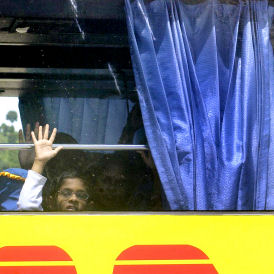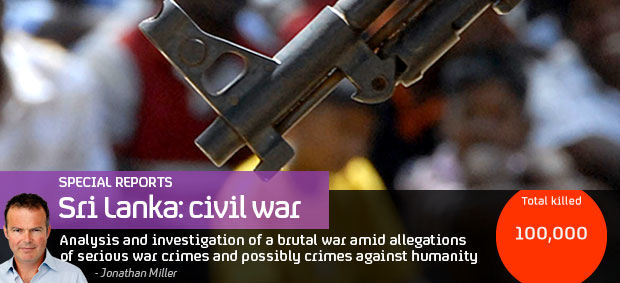Sri Lankans face deportation despite safety fears
As Channel 4 broadcasts a harrowing documentary about atrocities at the end of Sri Lanka’s civil war, we learn of at least 40 Sri Lankans who are being deported back into danger from the UK.
The Channel 4 documentary, Sri Lanka’s Killing Fields, features devastating video evidence of horrific war crimes committed by both the Sri Lankan Government and the Tamil Tigers in the final weeks of Sri Lanka’s civil war, in 2009.
And it did not end there. Channel 4 News recently obtained evidence from within Sri Lanka’s “closed off” corner, showing evidence of ongoing repression and abuse in the country.
Now we can reveal that Sri Lankans who fled to the UK for safety are being forced back into Sri Lanka – and into danger.
At least 40 asylum seekers, the majority of whom are Tamil, are being deported from the UK on a charter flight in two days’ time.
This is despite the Home Office’s own report on Sri Lanka, published in April, which says that “despite the end of the fighting, there continued to be human rights violations in 2010, including disappearances and extra-judicial killings, arbitrary arrests and a restriction on political space for free expression”.
At the end of the 2009 war, the Sri Lankan Government defeated the Tamil Tiger organisation. Fresh footage in the Channel 4 documentary reveals new evidence of Sri Lanka executions committed during the war, on top of many other similar videos.
However, it was not just the Tamil Tigers who were defeated. Up to 40,000 Sri Lankan civilians are also believed to have died, many of whom were Tamil, and others fled – including to the UK as well as other countries. Some have returned – the picture below shows some Tamils on their return trip after being denied asylum in Australia in 2010.
But human rights organisations believe Tamils are still in fear of their lives in Sri Lanka – particularly those with any links to the Tigers. Some of those seeking asylum in the UK could now be forced back by the UK Government after having their applications denied.
The Home Office has refused to confirm the existence of the deportation flight, but Channel 4 News has obtained a copy of one of the deportation orders: flight number PVT 030 to Sri Lanka, on Thursday.
Sam Zarifi, Asia Programme Director at Amnesty International, told Channel 4 News: “It is known that rejected asylum seekers have been detained and tortured.

“If the UK authorities were to rely on assurances drawn from the reported experiences of people returned to Sri Lanka over a year ago, that would not take into account the intervening increased hostility expressed by the Sri Lankan Government, in response to calls for an inquiry into war crimes committed at the end of the civil war.
“In such a climate, we would be alarmed if returns were being considered without an adequate assessment of the current threats to the safety of individuals, in a contemporary Sri Lanka, where tensions run high.”
But a UK Border Agency spokesperson said: “Returns to Sri Lanka will only be undertaken if we are satisfied that the individual has no protection needs. The improving political and security situation in Sri Lanka has meant it is safe to remove people there.”
Fear for their lives
However, those facing deportation told us they are terrified of what could happen to them if they are sent back – and worry they are in an even worse position following actions by the Home Office.
Five of the people on the deportation list for Thursday allege that they have had incriminating paperwork supplied by the Home Office to the Sri Lankan authorities tainting them with association with the Tigers. One has already tried to commit suicide to avoid what could happen to him in Sri Lanka.
He told us he feels his confidentiality has been breached by the Home Office and his already fragile safety has been put further at risk.
Amnesty International’s Mr Zarifi added: “If people are being returned to Sri Lanka, who are known or are suspected to be Tamils associated with the LTTE, the possibility of reprisals from the authorities are of course a concern.”
The Home Office denied passing the paperwork to the Sri Lankans and said that one of the five cases was under review.

-
Latest news
-
Tim Booth of the band James’ on agism in music, topping the charts and AI6m

-
As India goes to the polls in the world’s largest election – what do British-Indians think?6m

-
Tees Valley: Meet the candidates in one of the biggest contests coming up in May’s local elections4m

-
Keir Starmer says public sector reform will be a struggle7m

-
Nicola Sturgeon’s husband Peter Murrell charged with embezzlement of funds from SNP1m

-






